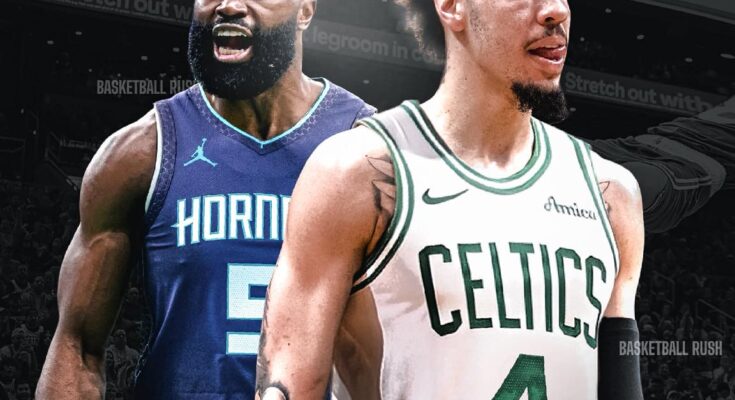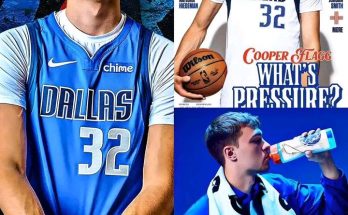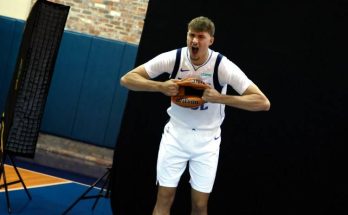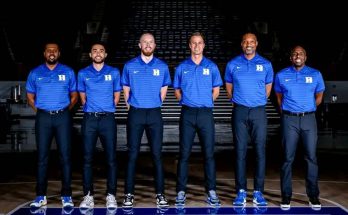The NBA has never lacked drama, and once again, the basketball world finds itself buzzing with speculation about a potential blockbuster move that could completely alter the trajectory of two franchises. According to recent reports, the Charlotte Hornets and Boston Celtics are exploring a trade centered around Jaylen Brown and LaMelo Ball, two of the league’s brightest stars. While nothing has been finalized, the very idea of such a deal has already sent shockwaves through the league, sparking heated debates among fans, analysts, and executives alike. A trade of this magnitude would not just be a routine transaction; it would represent a monumental shift in strategy for both organizations, a gamble on the present and the future, and a fascinating clash of philosophies when it comes to roster building.
Jaylen Brown’s situation with the Celtics has long been a subject of intrigue. He is coming off a stretch of seasons where he not only proved himself as one of the best two-way wings in the league but also earned recognition for his leadership and ability to thrive under pressure. A cornerstone of Boston’s identity, Brown has helped carry the Celtics deep into the playoffs alongside Jayson Tatum, forming one of the most formidable duos in basketball. Yet, despite their success, whispers of tension, fit concerns, and questions about whether the Celtics can break through to win multiple championships have lingered in the background. For all their firepower, critics argue that Boston’s offense can stagnate when both stars operate in similar areas, leaving some to wonder if the team might need to eventually split them up to maximize long-term success. Trading Brown would be a seismic move, but one that could open the door to a more traditional offensive structure centered on a true playmaking guard.
Enter LaMelo Ball, the former No. 3 overall pick by the Charlotte Hornets. Ball has dazzled the league since his arrival, bringing with him a rare blend of vision, creativity, and flair that has made him one of the most exciting young guards in the NBA. At just 23 years old, he has already been an All-Star and shown the ability to elevate the play of his teammates with his dynamic passing and fearless scoring. For Charlotte, he has been marketed as the face of the franchise, a foundational piece to build around for the next decade. But injuries and organizational struggles have limited the Hornets’ progress, leaving them stuck in a cycle of mediocrity. As gifted as LaMelo is, the question has increasingly become whether he can single-handedly lift a team like Charlotte into contention or whether his value is best realized in a system with established stars. By dangling him in trade talks, the Hornets could pivot from a long rebuild into a faster climb toward relevance, acquiring a proven All-NBA caliber wing in Brown who is in his prime and ready to lead.
For Boston, acquiring LaMelo Ball would signal a dramatic change in philosophy. Instead of sticking with their wing-heavy approach, they would be shifting to a guard-led system with Tatum as the anchor scorer and Ball as the creative orchestrator. The Celtics have not had a true floor general of LaMelo’s caliber in recent memory, and the thought of pairing his passing brilliance with Tatum’s scoring versatility is tantalizing. Ball could unlock a new dimension of Boston’s offense, one less reliant on isolation and more focused on fluid ball movement and transition excellence. Of course, with LaMelo come risks—chiefly his injury history and occasional defensive lapses. But Boston’s infrastructure, defensive schemes, and culture might be exactly what Ball needs to mature into the kind of superstar who not only dazzles on highlight reels but also wins at the highest level.
From Charlotte’s perspective, landing Jaylen Brown would instantly change their standing in the Eastern Conference. Brown is a battle-tested star with playoff pedigree, something the Hornets franchise has been sorely lacking for years. He brings toughness, scoring, and elite defense—traits that could help transform the Hornets into a more competitive team almost overnight. Pairing Brown with Brandon Miller, last year’s No. 2 overall pick, would give Charlotte a fearsome wing duo that could grow together and provide balance on both ends of the floor. While giving up a young star like LaMelo would hurt, the Hornets may feel that a wing-led core gives them a more stable foundation, especially given Ball’s health concerns and the uncertainty of how long he’d be content with the franchise’s rebuilding pace. For a team desperate to make noise in the playoffs and shake off years of irrelevance, Brown could be the catalyst for a new era.
The reaction around the league has been mixed but deeply passionate. Supporters of the trade argue that it makes sense for both sides: Boston gets the point guard it has been searching for, while Charlotte finally secures a proven All-Star capable of leading a franchise. Critics, however, warn that the risks may outweigh the rewards. For Boston, losing Brown could mean weakening their perimeter defense and disrupting the chemistry that has made them perennial contenders. For Charlotte, moving on from LaMelo could backfire if Brown doesn’t deliver immediate results or if he decides not to commit long-term. After all, Brown has spoken openly about wanting stability and the chance to compete for championships—something Charlotte has not been able to consistently offer. Would he buy into a Hornets rebuild, or would the franchise risk losing him for nothing in the future? These are the kinds of questions that make this trade scenario as controversial as it is intriguing.
Another layer to this story is how it would reshape the Eastern Conference. If the Celtics added LaMelo, they would arguably become even more dangerous, boasting a superstar duo that perfectly complements one another. Tatum would get easier looks thanks to Ball’s passing, while Ball would benefit from having elite scoring and defensive talent around him. For Charlotte, acquiring Brown would immediately raise their floor and give them a legitimate chance to compete for a playoff spot. Beyond the immediate implications, the move could also influence future free agents and trade targets, as both teams would be sending a message about their priorities and ambitions. Boston would be signaling its readiness to evolve and adapt, while Charlotte would be declaring that it is done waiting for the future and ready to compete now.
For the players themselves, such a trade would be career-defining. Jaylen Brown, who has spent his entire career with the Celtics, would face the challenge of proving he can be the undisputed leader of a team outside the shadows of Tatum. In Charlotte, he would no longer be the co-star but the central figure, tasked with elevating a young roster into playoff contention. That pressure could either cement his legacy as one of the NBA’s greats or expose limitations that critics have long speculated about. For LaMelo Ball, moving to Boston would place him on the biggest stage of his career. The Celtics, with their history, expectations, and championship-or-bust mentality, would demand consistency and maturity. If he could thrive in that environment, Ball could take the leap from flashy young star to perennial MVP candidate.
The financial aspect of this potential trade cannot be ignored either. Both players are on significant contracts, and making the numbers work would require careful maneuvering. Brown recently signed one of the richest contracts in NBA history, while Ball is on a max extension with Charlotte. Any deal would likely involve additional pieces, draft picks, or role players to balance salaries and ensure both teams feel they are getting fair value. The inclusion of such assets could ultimately be the deciding factor in whether or not the trade materializes. Would Boston be willing to part with future picks in addition to Brown? Would Charlotte demand more than just Brown in exchange for their franchise centerpiece? Negotiating these details would be just as complex as the decision itself.
Speculation aside, what makes this rumor so captivating is that it represents the kind of bold, high-stakes gamble that defines the NBA. Too often, teams cling to their stars out of fear of making the wrong move, but history has shown that fortune favors the bold. Trades like this are rare, but when they happen, they reshape the league’s landscape for years to come. Just as the Lakers trading for Anthony Davis or the Raptors acquiring Kawhi Leonard changed their franchises’ fortunes, a Brown-for-Ball swap could have similarly transformative effects. Whether it ultimately happens remains uncertain, but the mere possibility forces us to consider the different paths both the Celtics and Hornets could take.
In the end, the potential trade between the Celtics and Hornets centered around Jaylen Brown and LaMelo Ball is a storyline that captures everything fans love about the NBA: star power, risk, strategy, and the endless pursuit of glory. For Boston, it would be about taking the leap toward offensive versatility and a new identity alongside Jayson Tatum. For Charlotte, it would be about abandoning the slow grind of development in favor of an established star ready to compete now. For both franchises, it would represent a gamble with stakes as high as they come. As fans and analysts continue to debate the merits of such a move, one thing is certain—if this trade goes through, it will be remembered as one of the most consequential transactions in recent NBA history. Until then, the league waits with bated breath, knowing that sometimes the most dramatic changes come not from what has already happened, but from the whispers of what could be.



